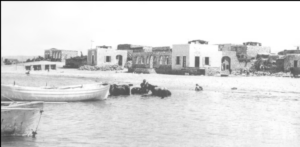- 764
- 766SHARES
In advance of Israel’s Memorial Day, which starts tonight and continues tomorrow, Haaretz yesterday published an Op-Ed by Gideon Levy about combat soldier Gideon Bachrach, the son of family friends who fell in battle at an Arab fishing village called Tantura during the 1948 war (“Why Didn’t You Tell Us About the Palestinian Village in Tantura?”). Levy, who is named after the fallen Gideon Bachrach, wrote:
According to historian Benny Morris in his book on the birth of the Palestinian refugee problem in 1947-49, the [pre-state paramilitary organization] Haganah decided in advance to expel the inhabitants of Tantura. According to one contentious version there was a massacre there.
The prevaricating language, “contentious version,” lends a hand of legitimacy to the claim in which the Haganah allegedly engaged in a war crime: the massacre of hundreds of unarmed Arabs, not involved in hostilities, who were lined up against a wall and shot to death. (The Hebrew article refers to a “controversial version.”)
But the Tantura “massacre” allegation, which originated in a University of Haifa Master’s thesis submitted by student Teddy Katz, is not merely “contentious.” Rather, it was thoroughly debunked after veterans of the Alexandroni Brigade who took part in the battle, completely denied the allegations and sued Katz for slander, prompting a thorough examination of the chain of lies, fabrications and distortions of testimonies orchestrated to smear the soldiers as war criminals.
CAMERA’s Ricki Hollander previously wrote, the soldiers
maintained that the battle for Tantura was a strategic one, an attempt to stop the maritime smuggling of arms and food and to prevent the Haifa-Tel Aviv road from being cut off; and that throughout the fight for survival in a bloody war launched by the Arabs, they had maintained the strictest ethical standards. While the battle for Tantura was difficult – 14 members of the IDF battalion and about 40 Arabs were killed in street fighting – the veterans insisted Katz had lied about a massacre.
At the end of the legal process, which Katz paid for with Palestinian Authority funding, he was compelled to publish at his own expense newspaper advertisements in which he completely repudiated the massacre lies, eliminating any possibility of generously referring to them as a “contentious version.” Katz’s ads stated:
After checking and re-checking the evidence, I am now certain beyond any doubt that there is no basis at all for the allegation that after Tantura surrendered, there was any killing of residents by the Alexandroni Brigade, or any other fighting unit of the IDF. I would like to clarify that what I wrote was misunderstood, and that I did not mean to suggest that there had been a massacre in Tantura, nor do I believe that there ever was a massacre at Tantura.
The University of Haifa disqualified Katz’s thesis, and also called upon other universities and educational institutions to remove any copies of the papers from their libraries. Katz subsequently regretted his decision to apologize, appealed to the High Court, and lost there as well, incurring additional court costs that he was required to cover.
Undeterred by the exhaustive legal process, Levy and Haaretz did not give up on the massacre libel. In order to keep the expired falsehood on life support, Levy wrote: “We were never told what happened on the beach of Tantura the way it really happened, since there was something to conceal there.” The online Hebrew version of the article contains a hyperlink to a 2002 Haaretz article reporting that Katz submitted an amended version of his rejected thesis, which he claimed contains “evidence substantiating the account of Tantura residents that a massacre was apparently carried out in the village in 1948.”
But Levy hides from his readers that the university rejected the revised thesis and gave Katz a failing grade, bringing the Tantura tale to a final death, leaving no room for the euphemistic “contentious” label.
Presspectiva, CAMERA’s Hebrew site, asked Gideon Levy:
What exactly remains “contentious” regarding Katz’s libel and what happened that we were never told “since there was something to conceal there”?
Levy responded:
There are more researchers who still believe that a massacre took place. By the way, as far as I know, the High Court never established that a massacre didn’t take place. It can’t, of course, make such a claim. It ruled that the agreement that Teddy Katz had with the Alexandroni soldiers was binding and that he cannot go back on it.
For the Hebrew version of this post, see Presspectiva.

